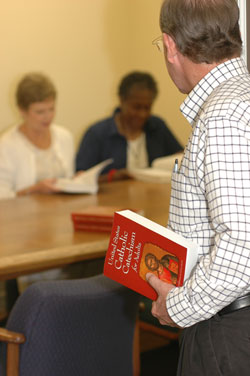Religious Education Supplement
Adult catechism helps varied groups grow in faith

Parishes across the archdiocese are using the United States Catholic Catechism for Adults in adult faith formation groups, youth ministry and the Rite of Christian Initiation of Adults program to help nurture the faith of its members, both young and old. (Photo illustration by Brandon A. Evans)
By Sean Gallagher
The United States Catholic Catechism for Adults (USCCA) went on sale a little over a year ago.
Since then, many catechetical leaders across the archdiocese have poured over this teaching tool created under the direction of the U.S. bishops’ Committee to Oversee the Use of the Catechism and approved by the Holy See in 2005.
Many will be using it this fall in their Rite of Christian Initiation of Adults program. Some began to use it right away in their catechetical and youth ministry programs.
Paula Richey, coordinator of youth and family ministries at St. Michael Parish in Greenfield, did this in the last academic year for the high school students she helps form in the faith.
“They’re searching for answers,” Richey said. “They really question things. And they see the headlines, and they are faced with defending their faith every day, especially in a public school setting.
“So I’m trying, through the catechism, to show them their Church history and the basis of where their faith comes from.”
Richey said the youths in her program responded favorably to the USCCA as well as the Compendium of the Catechism of the Catholic Church, which she also uses for lessons.
In fact, she thinks it has already helped these young men and women grow in their faith.
“I’ve had more kids go to pray at abortion clinics in the last year,” Richey said. “I think they’re identifying with
pro-life issues more and more.”
Ken Ogorek, archdiocesan director of catechesis, said that the USCCA was crafted with young people in mind as well as the culture they live in.
“The people drafting the document were trying to write on a level that most young adults in America would find fairly accessible,” he said. “The prose is not technical. It’s not academic.
“It’s very user-friendly. It’s not a complicated document. And that’s the beauty of a local catechism, to take the faith and … put it into a format that’s really accessible for folks in a particular country or region.”
The USCCA presents the faith in 36 chapters.
At the start of each chapter, the story of a saint or other holy man or woman is told. Many of them are connected to the Church in the United States.
That person’s story then sheds light on an aspect of the faith which is then explained in the bulk of the chapter.
Toward the end of each chapter are discussion questions, doctrinal statements, points for meditation and prayers related to the topic at hand.
Judy Koch oversees Our Lady of the Greenwood Parish’s catechetical programs, and she is planning on using the USCCA for adult faith formation groups.
Over her more than two decades of ministry at the Greenwood parish, a lot of resources for adult catechetics have come across her desk. Koch said the USCCA may be one of the best she’s seen.
“We’ve done a lot of small-group endeavors,” Koch said. “We have a lot of small Christian communities. And for a facilitator or a director, you have to put a lot of work into setting up what you’re going to study, what prayers you’re going to use, the questions you’re going to ask. [With the USCCA], the work’s all done for you.”
Koch said the discussion questions found in each chapter are quite helpful, describing them as “conversation provoking.”
“I think as people give and take with them, they’re going to hear other people’s ideas and interpretations about how what they’ve talked about affect their lives and how they’re going to live tomorrow,” she said.
Beyond small Christian communities and adult faith formation groups, volunteer catechists serving in a broad range of parish religious education programs help the people they serve, both young and old, learn the faith and put it into action in their daily lives.
Ogorek thinks the USCCA will, in years to come, help prepare catechists for this important duty.
“As we look at our own catechist formation efforts and certification process, I see the USCCA playing a major role in [this] in the future,” Ogorek said. “Catechists are teachers and witnesses. You might say that the doctrinal portions of each chapter put folks in a good position to teach the faith or, in the case of an adult who is not a catechist per se, to share that aspect of the faith with a friend or a neighbor, if you will.”
Helping Catholics pass on the faith, both in established parish programs or in more informal settings, such as the home, is a main purpose behind Father Rick Eldred’s effort to make the USCCA easily available in the parish offices at St. Vincent de Paul Parish in Bedford and St. Mary Parish in Mitchell, both of which he serves as pastor.
“I think our people are hungry for the faith, especially our young people and the young families,” he said. “That’s our obligation as teachers, to make the materials available. This catechism is the vehicle to do that, and to reinforce the Gospel that we preach at our Sunday Masses.” †
